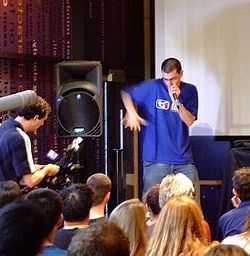British Iraqis
    | |
| Total population | |
|---|---|
|
Iraqi-born residents 32,236 (2001 Census) 65,000 (2009 ONS estimate) Other estimates 350,000–450,000 (2007 Iraqi embassy estimate) | |
| Regions with significant populations | |
| London, Birmingham, Manchester, Cardiff and Glasgow | |
| Languages | |
| Kurdish, Arabic, British English, Neo-Aramaic, Mandaic, and Turkmen | |
| Religion | |
| Islam, Christianity (Syriac Christianity and Eastern Catholic), Mandaeism, Judaism | |
| Related ethnic groups | |
| Arabs, Assyrians/Syriacs, Azeris, Caucasians, Cypriots, Iranians, Lebanese, Mizrahim, Palestinians, Syrians, Turks |
British Iraqis are people of Iraqi ancestry who were born in or who reside in the United Kingdom.
History
The UK has had a significant Iraqi population since the late 1940s.[1] Refugees including liberal and radical intellectuals dissatisfied with the monarchist regime moved to the UK at this time. Supporters of the monarchy subsequently fled to the UK after it was overthrown.[1] According to an International Organization for Migration mapping exercise, many settled Iraqi migrants in the UK moved for educational purposes or to seek a better life in the 1950s and 1960s. Some members of religious minorities were also forced to leave Iraq in the 1950s.[2] Other Iraqis migrated to the UK to seek political asylum during the dictatorship of Saddam Hussein, with large number of Kurds in particular migrating in the 1970s and 1980s,[3] or as a result of the instability that followed the 2003 invasion of Iraq.[2]
Demographics
Population size
The 2001 UK Census recorded 32,236 Iraqi-born residents,[4] and the Office for National Statistics estimates that, as of 2009, this figure had risen to around 65,000.[5] According to estimates by the Iraqi embassy, the Iraqi population in the UK is around 350,000–450,000.[2] At the time of the Iraqi parliamentary election in January 2005, the International Herald Tribune suggested that 250,000 Iraqi exiles were living in the UK, with an estimated 150,000 eligible to vote.[6]
Population distribution
According to community leaders in March 2007, there are around 15,000 Iraqis in London, 35,000 in Birmingham, 18,000 in Manchester, 8,000 in Cardiff and 5,000 in Glasgow.[2]
Ethnicity
According to the International Organization for Migration, ethnic Kurds are the most numerous ethnic group amongst Iraqis in the UK.[2] There are also sizeable numbers of Arabs, Assyrians[7] and Jews, as well as Turcoman, Armenians, Mandeans[8] and other ethnic groups.
Religion
Although the majority of Iraqis are Muslim, there are also minorities including Assyrian Christians, Jews,[2] and followers of Mandeanism,[8] Yazidism and Yarsan.
Notable individuals
Household Iraqi names in Britain include Mothercare founder Selim Zilkha, advertising agents Saatchi & Saatchi, architect Zaha Hadid, and broadcaster Alan Yentob.[9]
See also
- Assyrians in the United Kingdom
- British Kurds
- Iraqi people
External links
- British Iraqi Friendship Society
- Iraqi Community Association
- Iraqi Welfare Association
- Iraqi Youth Foundation
References
- ↑ 1.0 1.1 Change Institute (April 2009). "The Iraqi Muslim Community in England: Understanding Muslim Ethnic Communities". London: Communities and Local Government. p. 22. Retrieved 3 July 2010.
- ↑ 2.0 2.1 2.2 2.3 2.4 2.5 "Iraq: Mapping exercise". London: International Organization for Migration. March 2007. Retrieved 3 July 2010.
- ↑ Ansari, Humayun (2004). The Infidel Within: Muslims in Britain since 1800. London: C. Hurst & Co. pp. 162–163. ISBN 1-85065-685-1.
- ↑ "Country-of-birth database". Organisation for Economic Co-operation and Development. Retrieved 3 July 2010.
- ↑ "Estimated population resident in the United Kingdom, by foreign country of birth (Table 1.3)". Office for National Statistics. September 2009. Retrieved 8 July 2010.
- ↑ Davey, Monica (19 January 2005). "Iraqis far from home sign up to vote". International Herald Tribune. Retrieved 3 July 2010.
- ↑ http://www.bethsuryoyo.com/currentevents/AprimAssyriac/AssyriacDenied.html
- ↑ 8.0 8.1 http://www.mandaean.org.uk/
- ↑ "Iraqi Community Association". Refugee Stories. Refugee Community History Project. Retrieved 3 July 2010.
| |||||||||||||||||||
| ||||||||||||||